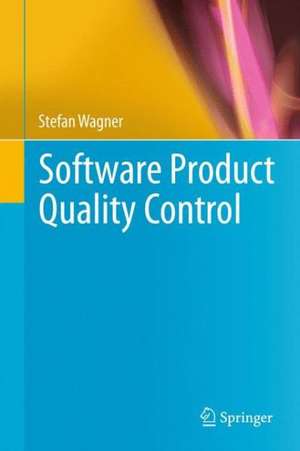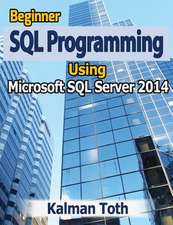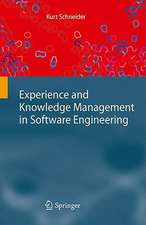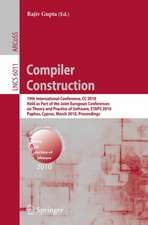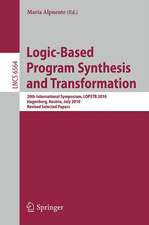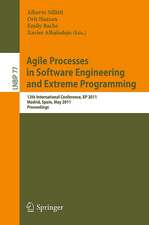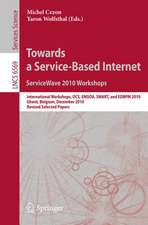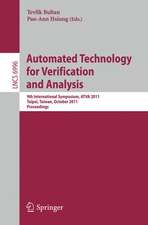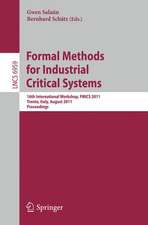Software Product Quality Control
Autor Stefan Wagneren Limba Engleză Hardback – 6 aug 2013
This book guides you in setting up and running continuous quality control in your environment. Starting with a general introduction on the notion of quality, it elaborates what the differences between process and product quality are and provides definitions for quality-related terms often used without the required level of precision. On this basis, the work then discusses quality models as the foundation of quality control, explaining how to plan desired product qualities and how to ensure they are delivered throughout the entire lifecycle. Next it presents the main concepts and techniques of continuous quality control, discussing the quality control loop and its main techniques such as reviews or testing. In addition to sample scenarios in all chapters, the book is rounded out by a dedicated chapter highlighting several applications of different subsets of the presented quality control techniques in an industrial setting.
The book is primarily intended for practitioners working in software engineering or quality assurance, who will benefit by learning how to improve their current processes, how to plan for quality, and how to apply state-of-the-art quality control techniques. Students and lecturers in computer science and specializing in software engineering will also profit from this book, which they can use in
practice-oriented courses on software quality, software maintenance and quality assurance.
| Toate formatele și edițiile | Preț | Express |
|---|---|---|
| Paperback (1) | 328.79 lei 6-8 săpt. | |
| Springer Berlin, Heidelberg – 7 aug 2015 | 328.79 lei 6-8 săpt. | |
| Hardback (1) | 333.72 lei 6-8 săpt. | |
| Springer Berlin, Heidelberg – 6 aug 2013 | 333.72 lei 6-8 săpt. |
Preț: 333.72 lei
Preț vechi: 417.15 lei
-20% Nou
Puncte Express: 501
Preț estimativ în valută:
63.87€ • 68.95$ • 53.56£
63.87€ • 68.95$ • 53.56£
Carte tipărită la comandă
Livrare economică 19 aprilie-03 mai
Preluare comenzi: 021 569.72.76
Specificații
ISBN-13: 9783642385704
ISBN-10: 3642385702
Pagini: 224
Ilustrații: XII, 210 p.
Dimensiuni: 155 x 235 x 18 mm
Greutate: 0.45 kg
Ediția:2013
Editura: Springer Berlin, Heidelberg
Colecția Springer
Locul publicării:Berlin, Heidelberg, Germany
ISBN-10: 3642385702
Pagini: 224
Ilustrații: XII, 210 p.
Dimensiuni: 155 x 235 x 18 mm
Greutate: 0.45 kg
Ediția:2013
Editura: Springer Berlin, Heidelberg
Colecția Springer
Locul publicării:Berlin, Heidelberg, Germany
Public țintă
Professional/practitionerRecenzii
"This is a compact introduction and perfect starting point to learn about software quality control. But experienced quality managers will also find many new ideas and insights."
Dirk Voelz, SAP AG, Germany
"An inspiring new view on software quality and how to control it, supporting developers and quality engineers in their daily work."
Christian Schubert, Capgemini, Germany
“Quality model-based approaches have been the core of our work for more than 10 years in our organisation. This book is a comprehensive presentation of practical methods that will make quality control work in practice. As the road to quality goes ever on, we are happy to join further endeavours to increase the benefits of quality model-based approaches.”
Christian Körner and Matthias Saft, Siemens AG Corporate Technology, Germany
Dirk Voelz, SAP AG, Germany
"An inspiring new view on software quality and how to control it, supporting developers and quality engineers in their daily work."
Christian Schubert, Capgemini, Germany
“Quality model-based approaches have been the core of our work for more than 10 years in our organisation. This book is a comprehensive presentation of practical methods that will make quality control work in practice. As the road to quality goes ever on, we are happy to join further endeavours to increase the benefits of quality model-based approaches.”
Christian Körner and Matthias Saft, Siemens AG Corporate Technology, Germany
Notă biografică
Stefan Wagner is a Professor of Software Engineering at the University of Stuttgart, Germany. He has received several awards for his industry-related research from both Google and at practitioner-oriented conferences, e.g. from CONQUEST 2010 and Software Quality Days 2012. His work uniquely combines scientific precision with industrial relevance and applicability.
Textul de pe ultima copertă
Quality is not a fixed or universal property of software; it depends on the context and goals of its stakeholders. Hence, when you want to develop a high-quality software system, the first step must be a clear and precise specification of quality. Yet even if you get it right and complete, you can be sure that it will become invalid over time. So the only solution is continuous quality control: the steady and explicit evaluation of a product’s properties with respect to its updated quality goals.
This book guides you in setting up and running continuous quality control in your environment. Starting with a general introduction on the notion of quality, it elaborates what the differences between process and product quality are and provides definitions for quality-related terms often used without the required level of precision. On this basis, the work then discusses quality models as the foundation of quality control, explaining how to plan desired product qualities and how to ensure they are delivered throughout the entire lifecycle. Next it presents the main concepts and techniques of continuous quality control, discussing the quality control loop and its main techniques such as reviews or testing. In addition to sample scenarios in all chapters, the book is rounded out by a dedicated chapter highlighting several applications of different subsets of the presented quality control techniques in an industrial setting.
The book is primarily intended for practitioners working in software engineering or quality assurance, who will benefit by learning how to improve their current processes, how to plan for quality, and how to apply state-of-the-art quality control techniques. Students and lecturers in computer science and specializing in software engineering will also profit from this book, which they can use in
practice-oriented courses on software quality, software maintenance and quality assurance.
This book guides you in setting up and running continuous quality control in your environment. Starting with a general introduction on the notion of quality, it elaborates what the differences between process and product quality are and provides definitions for quality-related terms often used without the required level of precision. On this basis, the work then discusses quality models as the foundation of quality control, explaining how to plan desired product qualities and how to ensure they are delivered throughout the entire lifecycle. Next it presents the main concepts and techniques of continuous quality control, discussing the quality control loop and its main techniques such as reviews or testing. In addition to sample scenarios in all chapters, the book is rounded out by a dedicated chapter highlighting several applications of different subsets of the presented quality control techniques in an industrial setting.
The book is primarily intended for practitioners working in software engineering or quality assurance, who will benefit by learning how to improve their current processes, how to plan for quality, and how to apply state-of-the-art quality control techniques. Students and lecturers in computer science and specializing in software engineering will also profit from this book, which they can use in
practice-oriented courses on software quality, software maintenance and quality assurance.
Caracteristici
Presents a state-of-the-art quality model for continuous software quality control Illustrates the application of techniques and methodologies using numerous real-world examples Enhanced by numerous checklists and commented suggestions for further reading Based on more than ten years of consulting experience for blue chip companies Includes supplementary material: sn.pub/extras
